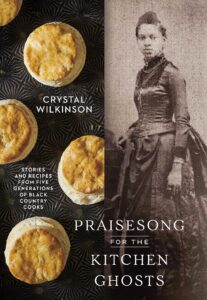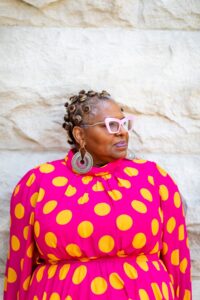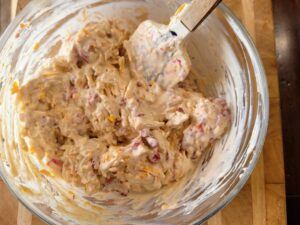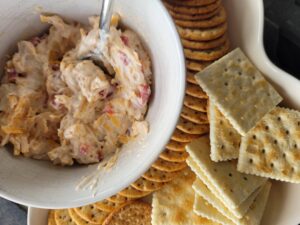I heard an author interview on NPR with Crystal Wilkinson and her latest work, Praisesong for the Kitchen Ghosts, and I just had to get on the waiting list at the library. It was a long wait but it was worth it.
 About the book:
About the book:
NATIONAL BESTSELLER – A lyrical culinary journey that explores the hidden legacy of Black Appalachians, through powerful storytelling alongside nearly forty comforting recipes, from the former poet laureate of Kentucky.
“With Praisesong for the Kitchen Ghosts, Crystal Wilkinson cements herself as one of the most dynamic book makers in our generation and a literary giant. Utter genius tastes like this.”–Kiese Laymon, author of the Carnegie Medal-winning Heavy
People are always surprised that Black people reside in the hills of Appalachia. Those not surprised that we were there, are surprised that we stayed.
Years ago, when O. Henry Prize-winning writer Crystal Wilkinson was baking a jam cake, she felt her late grandmother’s presence. She soon realized that she was not the only cook in her kitchen; there were her ancestors, too, stirring, measuring, and braising alongside her. These are her kitchen ghosts, five generations of Black women who settled in Appalachia and made a life, a legacy, and a cuisine.
An expert cook, Wilkinson shares nearly forty family recipes rooted deep in the past, full of flavor–delicious favorites including Corn Pudding, Chicken and Dumplings, Granny Christine’s Jam Cake, and Praisesong Biscuits, brought to vivid life through stunning photography.
Together, Praisesong for the Kitchen Ghosts honors the mothers who came before, the land that provided for generations of her family, and the untold heritage of Black Appalachia. As the keeper of her family’s stories and treasured dishes, Wilkinson shares her inheritance in Praisesong for the Kitchen Ghosts. She found their stories in her apron pockets, floating inside the steam of hot mustard greens and tucked into the sweet scent of clove and cinnamon in her kitchen.
Part memoir, part cookbook, Praisesong for the Kitchen Ghosts weaves those stories together with recipes, family photos, and a lyrical imagination to present a culinary portrait of a family that has lived and worked the earth of the mountains for over a century.
About the author:

from https://www.crystalewilkinson.net/bio
Crystal Wilkinson, a recent fellowship recipient of the Academy of American Poets, is the award-winning author of Praisesong for the Kitchen Ghosts, a culinary memoir, Perfect Black, a collection of poems, and three works of fiction—The Birds of Opulence, Water Street and Blackberries, Blackberries.
She is the recipient of an NAACP Image Award for Outstanding Poetry, an O. Henry Prize, a USA Artists Fellowship, and an Ernest J. Gaines Prize for Literary Excellence. She has received recognition from the Yaddo Foundation, Hedgebrook, The Vermont Studio Center for the Arts, The Hermitage Foundation and others. Her short stories, poems and essays have appeared in numerous journals and anthologies including most recently in The Atlantic, The Kenyon Review, STORY, Agni Literary Journal, Emergence, Oxford American and Southern Cultures.
She was Poet Laureate of Kentucky from 2021 to 2023. She currently teaches creative writing at the University of Kentucky where she is a Bush-Holbrook Endowed Professor.
What I thought….
Wilkinson listens to the women of her past and keeps them present with her in the kitchen, so much so that she has been known to hang her Granny’s dress in the kitchen with her during the holidays so she’s beside her in spirit.
The concept of kitchen ghosts came to me years ago when I realized that my ancestors are always with me and that the women are most present while I’m chopping or stirring or standing at the stove. The art of cooking and engaging with my kitchen ghosts made me realize that food is never just about the present—every dish, every slice, every crumb and kernel also tethers us to the past. (2)
Wilkinson actively listens and evokes her ancestors. Her writing style is flowing and poetic.
I invite each kitchen ghost in with open arms.
I take up the knife, the spoon, and the apron.
The watch.
I thank them. (34)
The food culture in Black churches helps bring people together for fellowship and I enjoyed Wilkinson’s chapter on “The Basket Meeting” and her grandmother’s contributions. These meals were full of caramel cakes, ambrosia, mac and cheese and cornbread. Even though the author doesn’t follow the exact religious traditions of her foremothers, she did create her own traditions. Sunday finds her house filled with music “remembrance and honoring the cooks from down home by cooking a meal large enough for a family of ten” (69) even though she only had three children.
“We church in our own memories while we garden and can and cook” (76).
Her memories are shared with photos from the family album but there are beautiful professional photos of her food. I loved the spread of Angel Food Cake (dressed up for a birthday) along with Pimento Cheese (with a kick) and Classic Benedictine and Chicken Salad with Curry tea sandwiches (110-11).
“What These Women Know About Bread” is a whole treatise (bordering on a rant) about the importance of cornbread, not only how to make it intuitively but also what to serve it with. The attempt to share the recipe over the phone with her husband (while she was away at a writing conference) ends in a quarrel. Her attempt to pass the recipe (only self-rising cornmeal, milk, eggs, and oil for the skillet) down to her daughter is heart-warming. When her daughter finished and it didn’t taste like she remembered, Wilkinson responds:
…I assured her that this moment, too, was as old as time, that we never thought we were as good as those old women who’d done it before us until they were gone. (140)
Periodically, Wilkinson will actually converse with her Kitchen Ghosts, asking about her history. At these times, she composes letters or long tales for her Ma Aggy or other long-lost matriarchs to share.
Again, I loved reading Wilkinson’s poetic prose and discovering the recipes of a “clan of women who knew their way around a kitchen, christened in the old ways, innovative enough to provide our own twists” (223). More so, I appreciated the history lesson that she imparts to the reader, one of the Appalachian Black farmers who settled in Indian Creek, Virginia.
As with a lot of books reviewed here recently, this book while not borne out of the pandemic, discusses a lot of pandemic experiences—grocery deliveries, “sanitizing” food from outside sources, trying to celebrate holidays without family. Wilkinson ends her book with the two pandemic “Harvest Celebrations” that she attempted. After the first one (2020), she realized that it was the only holiday she had spent without family. For her second Thanksgiving, she just prepared the regular feast, Buttered Pan-Roasted Turkey with Giblet Grave, six sides (from mashed potatoes to candied yams to greens), and cornbread dressing and yeast rolls. Dessert was chess pie. She and her husband then prepared to-go containers while one member of each family dropped by the house at scheduled times to pick up the holiday feast.
She invented this take-out service to see her grandchildren but to also keep the food traditions alive. She wants here great-grandchildren to be able to eat her grandmother’s rolls.
I am keenly aware that Black Appalachian foodways are a legacy to be treasured, to be passed on to the next and the next and the next. I’m thankful that my children and grandchildren will find their own ways to morph and change culinary traditions, to add to and subtract from their mother’s mother’s mother’s ways, to honor the calling of the kitchen ghosts, however they see fit. (233)
Food brings us together, even when we’re not. We can be separated by a pandemic or we can be separated by death; the Kitchen Ghosts are still present.
The Food:
There are at least two recipes shared with every chapter. I really wanted to list them all because they reinforce the varied recipes of not only Black Appalachia but also of every family. Yes, there are the old time recipes for Hot Milk Cake, Jam Cake, and Chicken and Dumplings. But, there are also recipes for Chicken Salad with Curry, Dark Crystal Latte, and No-Egg Scrambled Eggs. While varied, Wilkinson establishes them all as comfort food at its most comforting. Perhaps from the photo I mentioned before, I was really drawn to that pimento cheese. We seem to be buying a lot of it from Costco and I decided to try her recipe. 
I don’t generally reprint recipes from my cookbook reviews, but just know that using some cream cheese and horseradish elevates regular pimento cheese mightily. I highly recommend it and I thank Wilkinson and her Kitchen Ghosts for this recipe. I’m saving her jam cake, cucumber spread, and chicken salad to try at a later date.
I’m saving her jam cake, cucumber spread, and chicken salad to try at a later date.
Linking up with Foodies Read for April.
Postscript: After I reading Praisesong, I’m starting to dive into my own family lore and collected recipes and trying to call on my own Kitchen Ghosts.

Thanks for the review Debra.
Your review makes that book sound very tempting! I guess we all have our own kitchen ghosts, don’t we? I just posted a photo today of a recipe from my mother that was baked by my sister. We eat very differently, bht there are always connections to the women and kitchens who came before us.
best, mae at maefood.blogspot.com
Yes. I liked her comment about making recipes our own.
The book sounds very interesting. I’ll take your advice about adding cream cheese and horseradish to the next bowl of pimento cheese that I make.
Thanks for this review of a very unusual book, I was totally unaware of such a thing as Black Appalachian food! I’m getting the the book from the library first (7th on the hold list). I haven’t made pimento cheese in quite awhile, but for next time, the addition of cream cheese and horseradish would definitely take it up a few notches!
Kitchen and cooking memories are so strong and heartwarming for me. Every time I make a bechamel sauce, i think of my mum teaching me how to make it and me sitting on a kitchen stool to stir it as i was so little!